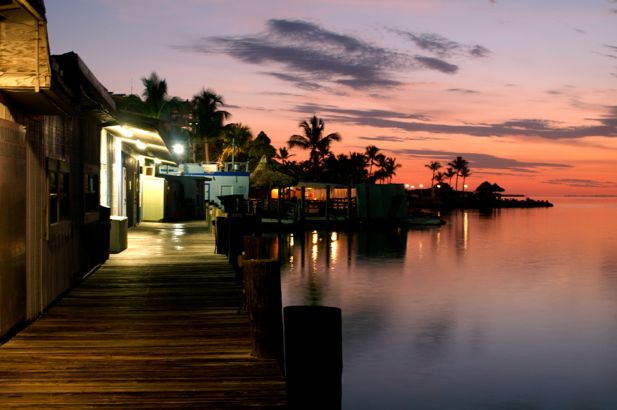Waiting for Oil in the Florida Keys
Tom Swick: On a visit to the islands, where some are now contemplating the unthinkable
05.11.10 | 10:56 AM ET
 Sunrise in the Florida Keys (iStockPhoto)
Sunrise in the Florida Keys (iStockPhoto)“Are people worried about the oil spill?” I asked a boat captain at one of the marinas.
“Yeah,” he said. “As much as people here worry about anything.”
The morning drive to Duck Key had been the usual freefall in reverse. Land became scarce, empty expanses of water closed in, and the world as I knew it slipped away. Islands by definition lend a feeling of isolation, which is only deepened when islands lead to islands as they do in the Keys. Driving—or better, sailing—there lets you luxuriate in an illusion of separateness.
The illusion was much more apparent this time, as I kept looking at the water and thinking of oil. Already in Key Largo I felt (as always) as if I were a continent away from Miami, but tragically close to the spill in the Gulf. The Keys are much more about water than they are about land, and the idea of the region marred—its fish and crustaceans and everything they touch (coral reefs, mangroves, beaches, marinas) and all who depend on them (birds, fishermen, restaurateurs, tourists)—was too awful to contemplate. Over the weekend, the blob described as three times the size of Rhode Island moved slightly to the west, but a change of wind could send it in a southeastern direction toward the Keys. And it is predicted that the gallons of oil leaked, currently registered at over three and a half million, could top 11 million, the amount let loose by the Exxon Valdez. Whoever gets hit—and it could be a number of states—will have to deal with an ecological and economic disaster.
Of course the Keys, for all their remoteness, have always been at the mercy of outside forces, be they natural (a monument in Islamorada commemorates those who perished in the hurricane of 1935) or man-made (the popularity of the place has turned a few old fishing lodges into luxury resorts).
The beauty of the Keys, in addition to the liquidy topography, is that nothing has destroyed the renegade spirit. In many parts of the country people love the outdoors, but usually in their spare time. Jonathan Raban wrote that Seattle is the first city in history that people moved to in order to be close to nature. Many residents of the Keys chucked it all to make a living in nature. And they didn’t become sanctimonious or preachy in the process; their interconnectedness with the natural world makes any show of earnestness unnecessary. A lived reverence allows for irreverence.
On my way home I stopped for lunch at the Green Turtle Inn in Islamorada, a longtime establishment distinguished for having no view of water. It has been upgraded from an old roadhouse; bottles of wine now fill a back wall. But the conch chowder is still delicious, and served with a bottle of pepper sherry.
As I sipped my soup, I read the Coconut Telegraph. The editorial on page 2 told of an upcoming benefit at the American Legion for a woman who “has worked hard for the community over the years” and recently underwent a double mastectomy. Turning the pages I found an article about the Bartender of the Month and a picture of the Drinker of the Month (“with his beautiful first mate”). Then I came to a full-page ad for the benefit at the American Legion, with a picture of the honoree, two balloons in the shape of breasts, and the words: “It’s a Booby Shower!”
I felt a small glimmer of hope about the possible onslaught.![]()